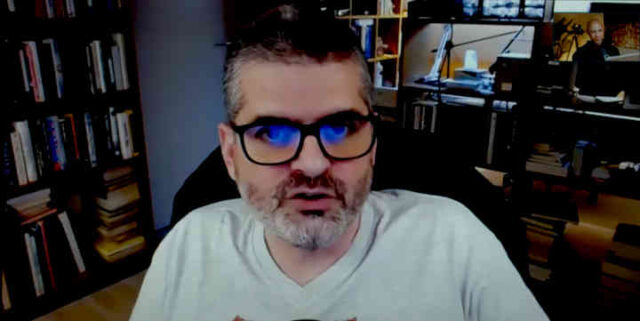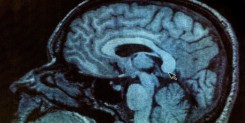We generally take the reality of the physical world for granted, except maybe when we watch a scifi movie like The Matrix. It is so obviously real, and if we ignore its hard reality we soon suffer the consequences.
But there are other ways to see things. One challenging alternative is the view of scientist and philosopher Bernardo Kastrup. A reader sent me a video of Dr Kastrup recently, and I think you’ll find his ideas as startling and challenging as I did.
All we know is inside our heads
Seeing isn’t as simple as it sounds. When we look at the outside world, light rays that are reflected or emitted by the objects around us enter our eys and set up electrical impulses in our optic nerves which are recived by our brains. Our brains interpet these signals and we “see” the world around us.
So it is obvious when we think about it that we don’t actually see the world, rather our brains interpret electrical signals that give us a representation of the world. This is obvious when we see an optical illusion, or wrongly interpret shadows. Or when our vision is impaired.
In fact all our perceptions of the world, all that we know, all scientific experiments, are only real to us as thoughts (brain activity) in our heads. We believe, from experience, that our sight and other senses give us realistic perception (otherwise we’d never survive) but our perception of the physical world is definitely mental.
All we know about the world is what we experience.
The hard problem of consciousness
Materialism (or physicalism or naturalism – the three terms mean much the same) is the view that the world, and we humans, are nothing other than physical things. Everything is matter and energy existing in time and space.
But materialism struggles to explain many aspects of our human experience. And perhaps none of these is more difficult than the “hard problem” of human consciousness.
I am conscious of myself and what my senses tell me. But I cannot know that you are conscious – you may in fact be a human without cosciousness that just appears to be conscious. I know how chocolate tastes to me, but I don’t know if it tastes the same to you, and there is no way I can test this.
Science is materialistic. It can measure and record mass and length and time and movement, brain activity and chemical composition. But it cannot measure consciousness, the taste and colour and emotions that we experience. Science measures material things, but consciousness is immaterial.
And science cannot explain how consciousness arose in evolution. How or why did the movement of atoms produce the sensation of taste or fear or joy? It doesn’t appear to be necessary for survival and reproduction, in fact it may get in the way, so why has it survived natural selection?
This is the “hard problem” of consciousness, and it is a challenge to materialistic science.
Three hypotheses
There seem to be three main attempts to explain the hard problem of consciousness. (There are many variations on these views, but this is my assessment.)
Everything is material?
The scientific materialist response is to argue that it is only a matter of time before science can explain these things in materialistic cientific terms. There are signs that progress is being made and we should be patient. Further, they say, alternative theories of consciousness cannot be verified or falsified, so are useless.
But critics say that:
- But neither can materialism be verified or falsified – it is an assumption that works for lots of aspects of life, but not others (such as consciousness).
- Materialists are explaining consciousness away, not actually explaining what it is and how it has arisen.
- Materialistic science can explain processes, but cannot explain why these physical processes are accompanied by feelings and experience. It can describe matter (its mass and chemistry, etc), but cannot explain what it is.
- The materialist view is (they say) already thrown into doubt by science itself. Matter and forces can now be reduced to quantum fields, which are a mathematical abstraction, and not material at all. And in quantum theory physical qualities like mass don’t exist at all, except when measured.
- Since we know everything through experience, experience is the primary fact, materialistic science is secondary. We should trust our experience of consciousness more than we trust the assumptions of materialistic science.
So materialism remains the dominant theory among scientists, but philosophers are increasingly looking at other options.
Everything is mental?
This at first seems weird and contrary to experience. Surely the physical world is the most obvious reality? How an it be mental?
But, proponents say, our experience of the physical world is mental, in our heads. Without the mental, we wouldn’t experience anything. Further, we know what it is like to experience something that seems “real” and physical, but isn’t – in dreams and hallucinations, and perhaps even in computer simulations.
This belief can be worked out in several ways. Panpsychism is the view that everything we see in the universe, down to the smallest particle, is actually mental and in some sense conscious, but appears physical to us. The mental or consciousness is more basic in the universe than is matter.
Intuitively, it seems crazy to think that atoms are conscious. But more importantly panpsychism seems to fail because quantum physics shows that elementary particles are actually excitations of a quantum field and not static “things” at all. We can’t easily define what is a “thing” and what is “two things”.
So panpsychism cannot explain how all these little consciousnesses, which are moving in and out of larger objects like our brains, somehow come together to make us conscious. And if we consider a table to be conscious, does it become two conscious objects if we cut off one leg, and if we glue the leg back on, does it become one consciousness again? Panpsychism just seems too clumsy and unreal.
So we come to the ideas of Bernardo Kastrup, a research scientist turned philosopher. Dr Kastrup has revived the ancient philosophy of Idealism (it goes back to Plato, and was popular in Britain in the early 20th century).
Idealism is the idea that what we see around us is a manifestation of a “higher” reality, mind or consciousness. But instead of arguing that every physical thing is conscious, he argues that the reality behind the universe is a universe consciousness. We are created out of that universal mind by a process of dissociation – similar to when a person has dissociative identity disorder, a process well understood in neuroscience. Each of us is a separate mind created out of the universal mind and we each see the illusion of a physical world. Mind is the reality, the physical universe is its representation to us. This is true (it is said) of all life, not just human life.
It is easy to see the philosophical attraction to this startling and unusual idea – it solves the hard problem (and other problems of materialism) in a simple way. But as critics say, it is fanciful and impossible to demonstrate. And it raises as many problems as it solves. How did the universal mind originate? Why does it dissociate? In what sense do it, and us, and the illusion of the external world exist? How come we all see the same illusion? If we don’t exist in space and time, how and where do we exist? And how do we define life – does it include viruses, amoeba, etc?
Idealism seems to me to have some natural affinity with Buddhism – the illusion of self and the ultimate goal of us returning to the cosmic reality. But it seems far removed from our everyday experience.
Dualism – both matter and mind
Materialism says everything is material. Idealism says everything is mental. The third way to solve the hard problem is to accept that both material and mental are real. This is known as dualism, and comes in several forms.
Most of us tend to think in dualistic terms and researchers say young children are naturally dualistic. It feels right. It seems to be in accordance with how we see human beings – we are composite physical and mental beings.
Dualism has its own difficulties too of course. Neuroscientists tend to reject it because their science deals with the material but does not recognise the mental as something in its own right. And it is hard to explain how our mental processes can actually change anything physical such as the physical processes in our brains, especially as materialists say the physical causal system is closed and nothing can affect it from “outside”. But this is a difficult claim to prove (or disprove).
Materialists and idealists alike also argue that dualism is more complex than their own theories, and using Occam’s Razor, the simplest explanation should be preferred. But it is only the simplest explanation that fits all the facts, and it can be argued that neither materialism nor idealism explain all the facts.
My personal preference is to say that since the material and the mental both appear to be real, why not treat them both as real until and if we can demonstrate that one of the other is derivative.
Where does God fit in?
Clearly materialism cannot include the existence of God as we normally use the term. God is supposed to be non-material, and materialism says there is nothing that isn’t material. But materialism cannot satisfactorily explain our common human experience of consciousness, free will, objective right and wrong and logic-based brain thinking. So if it can’t explain thjose things, it could easily be wrong about God too.
Idealism can more easily fit God in. If the universal consciousness is seen as God, then we just have to add to our understanding of universal consciousness whatever characteristics we believe are true of God, and, superficially at least, an idealist is believing in God. But the Gods of the great monotheistic religions don’t fit easily because they see God as separate and other than the universe, which they regard as real, not just an appearance as Dr Kastrup claims. So if we want to explain consciousness, it seems preferable to me to embrace dualism rather than idealism. Dr Kastrup’s ideas are engaging and interesting, but in the end they don’t convince me.
Dualism is the obvious viewpoint for theists. Because the universe was created by God, he has created it with both mental/spiritual and physical aspects. Our science doesn’t know how to measure the mental/spiritual let alone explain it, but our common human experience has no problem with it. This allows us to believe consciousness is real, we do have free will, some things really are right and wrong, and our thinking can be based on logic. And believe God created it all.
Read more
- The mystery of consciousness. On this site.
- The true nature of reality. Dr Bernardo Kastrup on Youtube.
- The idea of the world and Panpsychism and the problem of consciousness. Richard Gault in Beshara Magazine.
- The Hard Problem of Consciousness. Internet Encyclopedia of Philosophy.
- A neurophilosophical slant on consciousness research. Patricia Churchland, Progress in Brain Research, 2005.
- A good critique of panpsychism but a lousy alternative. Jerry Coyne, Why Evolution is true.
Photo: Dr Bernardo Kastrup, from his video: The True Nature Of Reality.





I can tell you exactly what we are if you want to know the truth instead of religion and science which has bastardized both in the name of righteousness
Very nice summary of Kastrup.
***
If you want to “up” the challenge, take a closer look at the way some of these words are used.
***
When you speak of “matter” – are you speaking of what we experience? For example very often when you talk to skeptics about the fact that we don’t know if “matter” as defined by physicists exist, they’ll say something like “Yeah? Go stand in front of a train and tell me matter doesn’t exist.”
***
As Bernardo has said, one would have to be a complete lunatic to claim matter in that sense doesn’t exist. Let’s refer to that as “experiential matter.’
***
“Matter” as used by physicists refers to a purely abstract construct, one inferred by our experience but never directly known, not even by scientific methods.
***
So when Samuel Johnson heard Bishop Berkeley say “everything is in the mind” and kicked a stone saying of the Bishop’s idea, “I refute it thus!” he actually confirmed it – when he did was, use his mind to direct a part of his body to move toward a perception (labeled stone) and had an experience of minor pain in the process of doing so – thus reinforcing the obvious indisputable fact that all experience occurs within consciousness, and never has any human being had, and never will they, by definition, have an “experience” of something we think of as pure physical stuff, that is, stuff outside of experience.
****
If you understand simply that it’s impossible to have an experience or have any evidence of anything outside experience, you haven’t refuted materialism, you’ve just rendered it both irrelevant and incoherent.
***
Even neuroscientist/atheist Sam Harris admits this, he just says, “I know there’s no logical support for materialism, I just like it better.”
***
ok!
Hi Don, thanks for these thoughts. I agree it is interesting that we only know the physical world via our own senses, experience and consciousness, even when that is reading a meter or computer screen. I’m not sure that refutes materialsim, but it is certainly a difficulty for that view. I still have a lot to learn about all this.